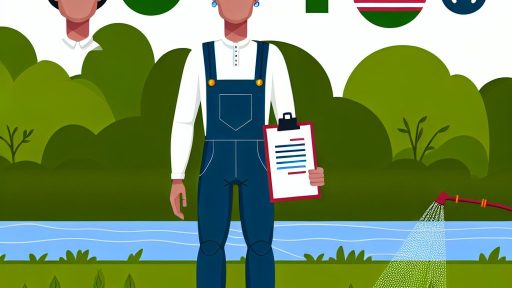Overview of Sustainable Farming Practices in Aquaponics and Hydroponics
Principles of Sustainable Aquaponics
Aquaponics combines fish farming with plant cultivation in a shared ecosystem.
It recycles water efficiently between aquatic animals and plants.
This system reduces water usage compared to conventional farming methods.
Furthermore, it minimizes chemical fertilizer needs by using natural fish waste as nutrients.
Many farms, like BlueHarbor Aquaponics, implement these methods to boost sustainability.
Additionally, closed-loop systems maintain ecological balance by limiting waste discharge.
Sustainable Hydroponic Techniques
Hydroponics grows plants without soil by delivering nutrients through water.
This method uses up to 90% less water than traditional agriculture.
Urban farms, including GreenSprout Farms, optimize space through vertical hydroponic setups.
They also rely on renewable energy sources to power grow lights and pumps.
Moreover, organic nutrient solutions replace synthetic chemicals to protect ecosystems.
These steps reduce pollution and enhance crop quality in hydroponic farming.
Environmental Benefits of Sustainable Practices
Sustainable aquaponics and hydroponics lower the carbon footprint of food production.
They help conserve freshwater resources globally under increasing demand.
Also, these methods reduce soil erosion and degradation by eliminating the need for soil.
Transform Your Agribusiness
Unlock your farm's potential with expert advice tailored to your needs. Get actionable steps that drive real results.
Get StartedFarms applying these practices decrease pesticide and herbicide usage significantly.
As a result, local biodiversity often improves near sustainably managed farms.
Innovative Technologies Supporting Sustainability
Smart sensors monitor water quality and nutrient levels in real-time.
These technologies optimize resource use and reduce waste effectively.
For example, AquaSense Systems provides IoT tools that enhance farm efficiency.
Automation also lowers labor demands while maintaining system health and productivity.
Incorporating renewable energy, like solar panels, further decreases environmental impact.
Commitment to Certification and Standards
Farmers increasingly seek sustainability certifications to validate their practices.
Organizations such as GreenEarth Certifiers audit aquaponic and hydroponic operations rigorously.
These certifications encourage transparency and continuous environmental improvement.
Moreover, they help farms access markets that value certified sustainable produce.
Ultimately, certification supports accountability and fosters consumer trust.
Importance of Certification for Sustainable Farming Systems
Enhancing Credibility and Trust
Certification provides clear evidence of sustainable practices.
Farmers gain credibility with consumers and industry partners.
It helps Aquaponic and Hydroponic farms stand out in the market.
Buyers prefer products verified for environmental and social responsibility.
Certification builds trust in sustainable farming brands.
Ensuring Environmental Responsibility
Certification standards promote efficient resource use.
They reduce water waste and energy consumption effectively.
Farms achieve measurable environmental benefits as a result.
Certifiers monitor compliance to maintain high sustainability levels.
This oversight encourages continuous improvement among farmers.
Supporting Market Access and Premium Pricing
Many retailers require certification for sourcing sustainable products.
Certified farms access broader markets locally and internationally.
Showcase Your Farming Business
Publish your professional farming services profile on our blog for a one-time fee of $200 and reach a dedicated audience of farmers and agribusiness owners.
Publish Your ProfileThey often receive premium prices for certified produce.
Certification differentiates products in competitive agricultural markets.
It creates economic incentives to adopt sustainable methods.
Encouraging Best Practices and Innovation
Certification programs share valuable knowledge and resources.
They encourage aquaponic and hydroponic farmers to innovate sustainably.
Farmers adopt cutting-edge techniques to improve yields and reduce impacts.
Peer networks foster collaborative problem-solving and growth.
Certification helps transform farming into a future-focused industry.
Protecting Consumer Health and Safety
Certified farms adhere to strict guidelines on chemical and biological use.
This reduces contamination risk in food production systems.
Consumers receive safer and healthier food products as a result.
Certification signals commitment to high food quality standards.
It reassures customers about the safety of aquaponic and hydroponic produce.
Key Certification Standards for Aquaponics and Hydroponics
Organic Certification
Organic certification applies to aquaponics and hydroponics when synthetic inputs are restricted.
It ensures that nutrient sources are natural and sustainably sourced.
Many certifying bodies require strict control of water quality and waste management.
Farmers like Elena Martinez from GreenWave Farms emphasize organic methods to meet market demand.
Therefore, organic standards increase consumer trust in aquaponic and hydroponic produce.
Sustainable Agriculture Standards
Sustainable agriculture certifications focus on resource efficiency and environmental impact reduction.
Programs like the Sustainable Agriculture Network (SAN) offer guidelines tailored to controlled environment agriculture.
They promote water conservation, energy efficiency, and reduced chemical use.
Additionally, these standards encourage social responsibility and fair labor practices.
For example, BlueRiver Aquaponics follows SAN principles to optimize their production sustainably.
GlobalG.A.P. Certification
GlobalG.A.P. is a widely recognized standard for food safety and sustainability in horticulture.
It includes modules specific to hydroponic systems and integrated plant production.
This certification verifies traceability, hygiene, and environmental compliance.
HydroGrow Solutions, led by CEO Marco Liu, holds GlobalG.A.P. certification to access global markets.
Consequently, GlobalG.A.P. facilitates trust between producers and retailers worldwide.
Water and Energy Use Certifications
Specialized certifications target efficient water and energy usage in aquaponic and hydroponic farms.
These programs measure and verify water recycling rates and renewable energy integration.
For instance, AquaHarvest Farms adopted the Water Stewardship certification to highlight sustainable water management.
In addition, the Energy Star program assists farms in reducing electricity consumption for system pumps and lighting.
Ultimately, these certifications reinforce the farm’s commitment to environmental stewardship.
Food Safety Certifications
Food safety is essential for certified aquaponics and hydroponics operations.
Standards like SQF (Safe Quality Food) and HACCP ensure hazard analysis and risk control.
Implementing these minimizes contamination risks in both fish and plant production.
OceanSprout Hydroponics, managed by Natalie Cruz, maintains HACCP certification to guarantee safe produce.
Therefore, food safety certifications increase brand credibility in consumers’ eyes.
Local and Regional Certification Programs
Many regions develop their own certification programs aligned with local environmental and social priorities.
The Pacific Northwest Aquaponics Alliance endorses best practices suited for the area’s climate.
Showcase Your Farming Business
Publish your professional farming services profile on our blog for a one-time fee of $200 and reach a dedicated audience of farmers and agribusiness owners.
Publish Your ProfileSimilarly, the Northeast Hydroponics Council offers tailored guidelines for water conservation.
Such programs support smaller farms to meet certification without excessive costs.
Moreover, regional certifications enhance community trust and market access for certified growers.
Explore Further: Biogas Production and Its Role in Farm Sustainability
Steps to Achieve Sustainable Farm Certification
Understanding Certification Requirements
Begin by researching the specific criteria for sustainable farm certification.
Organizations like Evergreen Agri Alliance provide detailed guidelines for aquaponics and hydroponics.
Additionally, review local regulations to ensure full compliance with sustainability standards.
Consult with experts such as GreenFields Consulting for tailored advice.
Assessing Current Farm Practices
Evaluate your existing farming methods to identify sustainability gaps.
Conduct water and energy usage audits to measure efficiency.
Moreover, examine your nutrient management systems for environmental impact.
Engage your team in discussions to gather insight on farm operations.
Implementing Sustainable Practices
Water Conservation Techniques
Install drip irrigation systems to reduce water waste.
Use rainwater harvesting to supplement farm water supplies.
Furthermore, recycle aquaponic water to maintain system balance.
Energy Efficiency Improvements
Switch to LED grow lights to lower energy consumption.
Incorporate solar panels to power pumps and other equipment.
Regularly maintain systems to prevent unnecessary energy loss.
Organic and Eco-Friendly Inputs
Replace chemical fertilizers with organic alternatives like compost tea.
Apply beneficial microorganisms to enhance plant and fish health.
Choose pest control methods that are safe and environmentally sound.
Documentation and Record-Keeping
Maintain detailed logs of all farming activities and inputs.
Keep records of water tests, energy bills, and waste management.
Organize documentation to facilitate audit processes.
Use farm management software such as AquaGrow Tracker for accuracy.
Engagement with Certification Bodies
Contact certification agencies to schedule on-site evaluations.
Prepare your team to demonstrate sustainable practices clearly.
Answer auditors’ questions transparently to build trust.
After evaluation, review feedback and implement recommended improvements.
Advancing Sustainability through Continuous Improvement
Adopt a culture of ongoing sustainability enhancements on your farm.
Regularly update practices based on new technologies and research.
Schedule periodic re-certification to maintain your farm’s status.
Moreover, share your success stories to inspire community-wide sustainability.
See Related Content: Growing Medicinal Plants in Agroforestry Systems Across the USA
Challenges in Obtaining Sustainable Certification in Aquaponics and Hydroponics
Complexity of Certification Standards
Certification standards often lack clear guidelines specific to aquaponics and hydroponics.
This ambiguity creates confusion for farmers trying to comply with requirements.
Moreover, some standards prioritize traditional soil-based farming practices.
Consequently, aquaponic and hydroponic producers face difficulties in demonstrating sustainability.
Organizations like GreenSprout Farms have noted inconsistent audit processes across certifiers.
This inconsistency complicates the certification journey for many operators.
Showcase Your Farming Business
Publish your professional farming services profile on our blog for a one-time fee of $200 and reach a dedicated audience of farmers and agribusiness owners.
Publish Your ProfileResource and Cost Constraints
The certification process demands significant financial investment in documentation and auditing.
Small-scale farms such as BlueStream Aquaponics often struggle to allocate sufficient budgets.
Additionally, time commitments for paperwork and inspections strain operational capacities.
Furthermore, many farms require expert consultation to fully understand certification criteria.
These factors can discourage emerging growers from pursuing sustainability certification.
Technical and Environmental Challenges
Aquaponics and hydroponics systems require precise nutrient and water management to meet standards.
Variations in water sources and quality can affect compliance with environmental benchmarks.
Some farms experience difficulties maintaining balanced ecosystems within closed-loop systems.
In response, farm managers like Rachel Lin implement advanced monitoring technology for control.
Nevertheless, evolving sustainability benchmarks require continuous adaptation by producers.
Lack of Unified Certification Frameworks
Currently, no single authoritative body governs sustainability certification for aquaponics and hydroponics.
Multiple certifiers use differing evaluation methods and criteria.
This fragmentation causes uncertainty regarding the most reputable certifications to pursue.
For example, EcoFarm Standards and AquaPlus adopt varying approaches to assess sustainability.
Therefore, farms face challenges selecting certifications aligned with their production models.
Enhancing Consumer Trust Through Certification
Despite challenges, certifications remain crucial to authenticating sustainable practices.
They foster consumer confidence in environmentally conscious produce.
Companies like VerdantFresh Farms report increased market access after obtaining certification.
Thus, overcoming certification obstacles presents vital opportunities for industry growth.
Ongoing collaboration between certifiers and producers can improve clarity and feasibility.
Find Out More: Sustainable Irrigation Practices for Organic Farming Operations

Benefits of Certified Sustainable Practices for Farmers
Enhanced Market Access and Consumer Trust
Farmers who adopt certified sustainable practices gain access to premium markets.
Certification builds trust with environmentally conscious consumers.
Consequently, they can command higher prices for their aquaponics and hydroponics products.
This trust often leads to increased customer loyalty and repeat business.
Improved Operational Efficiency and Cost Savings
Implementing sustainable standards encourages the efficient use of resources.
For example, water recirculation technologies reduce waste and lower costs.
Furthermore, energy-efficient systems can significantly decrease utility expenses.
Additionally, certified farms often optimize nutrient management, improving crop yields.
Positive Environmental Impact and Regulatory Compliance
Certified sustainable farms minimize environmental degradation effectively.
They reduce chemical runoff and enhance ecosystem health surrounding the farm.
Hence, farmers face fewer regulatory issues and penalties.
Compliance with sustainability standards also prepares farms for future regulations.
Access to Support and Funding Opportunities
Certification opens doors to grants and low-interest loans aimed at sustainable farming.
Many organizations prioritize certified farms for financial and technical assistance.
In turn, this support helps farmers invest in advanced aquaponics and hydroponics technologies.
Consequently, farm growth and innovation become more attainable and sustainable.
Strengthened Community Reputation and Networking
Farms with sustainable certification often gain respect within local communities.
This status improves relationships with suppliers, customers, and local authorities.
Moreover, certified farmers can join networks that share best practices and resources.
Showcase Your Farming Business
Publish your professional farming services profile on our blog for a one-time fee of $200 and reach a dedicated audience of farmers and agribusiness owners.
Publish Your ProfileThese connections foster collaboration and collective advancement in sustainable agriculture.
Delve into the Subject: Sustainable Goat Farming Methods for Milk and Meat Production
Case Studies of Successful Certified Aquaponics and Hydroponics Farms
GreenWave Aquaponics Farm
GreenWave Aquaponics Farm achieved sustainable farm certification in 2022.
They integrate fish and vegetable production using eco-friendly methods.
This farm uses renewable energy sources to power their systems.
Moreover, they recycle water efficiently, reducing waste significantly.
GreenWave’s certification helped expand their market access and customer trust.
ClearSprings Hydroponics
ClearSprings Hydroponics received sustainable certification for energy and water conservation.
They use novel LED lighting that cuts electricity use by 40%.
Additionally, ClearSprings employs organic nutrient solutions to minimize chemical inputs.
This approach supports better crop health and environmental protection.
The certification boosted their brand recognition among eco-conscious consumers.
BlueHarvest Aquaponic Systems
BlueHarvest specializes in tilapia and leafy greens using certified sustainable practices.
They implement closed-loop systems to limit water loss and contamination.
Furthermore, BlueHarvest collaborates with local universities to improve sustainable technology.
The farm’s certification attracted investment and community support.
As a result, BlueHarvest expanded production while maintaining environmental standards.
PureGrowth Vertical Hydroponics
PureGrowth Vertical Hydroponics focuses on urban farming sustainability.
They utilize vertical towers to maximize space and reduce land use.
PureGrowth also applies integrated pest management instead of chemical pesticides.
The sustainable certification validates their commitment to urban environmental health.
This status helped them form partnerships with local restaurants and markets.
EcoBloom Aquaponics Collective
EcoBloom combines community engagement with sustainable aquaponics farming.
The collective uses solar-powered pumps and natural filtration systems.
Additionally, they provide education programs to promote sustainable agriculture.
Certification increased their visibility and funding opportunities.
Consequently, EcoBloom scaled operations while empowering local growers.
Benefits Experienced by Certified Farms
- Improved resource efficiency and environmental performance.
- Greater market competitiveness due to verified sustainability claims.
- Access to eco-conscious customers and new distribution channels.
- Increased opportunities for grants and sustainable investment.
- Enhanced community relationships through transparency and education.
Key Practices Leading to Certification
- Use of renewable energy and water recycling systems.
- Organic or natural nutrient and pest management solutions.
- Closed-loop systems that minimize waste and pollution.
- Consistent monitoring and documentation of sustainable practices.
- Collaboration with experts to innovate and improve methods.
Future Trends in Sustainable Farm Certification
Integration of Advanced Technologies
Certification bodies increasingly adopt blockchain for transparency and traceability.
This technology ensures data integrity throughout the certification process.
Moreover, IoT devices help monitor sustainability parameters in real-time.
Consequently, farms receive faster and more accurate sustainability assessments.
Expansion of Certification Standards
Certification standards now cover social and economic sustainability factors.
They emphasize fair labor practices and community impact alongside environmental goals.
Additionally, certifications incorporate biodiversity conservation and carbon footprint reduction.
This broad approach supports holistic sustainability in aquaponics and hydroponics.
Collaboration Among Certifying Organizations
Organizations like Evergreen Agro Institute and TerraGreen Alliance increasingly collaborate.
They harmonize criteria to reduce certification redundancies for farmers.
Such unity simplifies compliance and promotes global benchmarking.
Therefore, certified farms gain higher credibility in international markets.
Innovations in Aquaponics and Hydroponics
Advances in System Design
New system designs enhance water reuse and energy efficiency significantly.
Showcase Your Farming Business
Publish your professional farming services profile on our blog for a one-time fee of $200 and reach a dedicated audience of farmers and agribusiness owners.
Publish Your ProfileVertical farming innovations maximize space in urban environments.
Smart sensors optimize nutrient delivery to plants and fish.
Hence, yields increase while resource consumption decreases sharply.
Development of Sustainable Inputs
Researchers create organic nutrient solutions derived from seaweed and compost extracts.
These inputs reduce reliance on synthetic fertilizers and chemicals.
Additionally, biofilters using beneficial microbes improve water quality naturally.
This innovation promotes healthier ecosystems within aquaponic setups.
Enhanced Monitoring and Automation
Automation platforms like AquaSense improve system stability and ease of management.
They use AI to predict and adjust environmental conditions proactively.
Farmers benefit from reduced labor demands and increased consistency.
Thus, technologies lower operational costs and environmental impact simultaneously.
Emphasis on Circular Economy Principles
Aquaponic and hydroponic farms adopt waste-to-resource strategies actively.
For example, fish waste converts into organic fertilizer for crop cycles.
This practice minimizes waste output and supports soil regeneration.
It also aligns farms with sustainability certification expectations effectively.
Additional Resources
Urban Agriculture | School of Environmental Sustainability: Loyola …
Center for Urban Agriculture & Gardening Education | College of …




